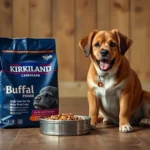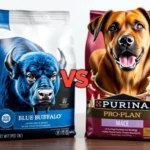
Introduction
Toy breeds, characterized by their small size and charming personalities, have become increasingly popular among dog lovers. These pint-sized pups, such as the Chihuahua, Pomeranian, and Maltese, often weigh under 10 pounds. While their small stature makes them adorable companions, it also means that their nutritional needs differ significantly from larger breeds.
Proper nutrition is critical for these little dogs because they are more susceptible to certain health issues like obesity and dental problems. Without the right diet, toy breeds can face serious health complications down the line. This article will guide you in selecting the best dog foods for toy breeds, ensuring your furry friend stays healthy and happy.
Understanding Dog Nutrition
Nutritional Needs of Toy Breeds
Toy breeds have unique caloric requirements that set them apart from their larger counterparts. Due to their fast metabolism, these small dogs need a higher calorie intake per pound of body weight. Factors such as age, activity level, and overall health also influence their caloric needs. For instance, a playful puppy will require more calories than a sedentary adult dog.
When it comes to macronutrients, toy breeds require a balanced mix of proteins, fats, and carbohydrates. Protein is essential for muscle development and overall health, while healthy fats support skin and coat condition. Carbohydrates provide the necessary energy for their active lifestyles.
Micronutrients play a crucial role in their diets as well. Essential vitamins and minerals contribute to immune function, bone health, and overall vitality. Antioxidants, found in fruits and vegetables, can help combat oxidative stress, making them invaluable for small breed diets.
Common Nutritional Challenges
Despite their small size, toy breeds face significant nutritional challenges. One of the most pressing issues is the risk of overfeeding. Obesity can lead to severe complications, including joint problems, diabetes, and heart disease. It’s crucial for pet owners to monitor portion sizes and choose the right food.
Another common concern is dental health. Toy breeds are prone to dental issues, so it’s essential to choose a diet that supports oral hygiene. Foods designed to promote dental health often have specific textures that help reduce plaque buildup.
Key Ingredients to Look For
High-Quality Proteins
When selecting the best dog foods for toy breeds, look for high-quality protein sources. Animal-based proteins, such as chicken, turkey, and fish, are vital for muscle development and overall health. These proteins should ideally come from named sources rather than vague terms like “meat by-products.”
Understanding the difference between meat and meat meal is also critical. Meat meal is a concentrated source of protein, as it contains the nutrient-dense parts of the animal, while moisture is removed. This makes meat meal a preferable option for toy breeds, ensuring they receive adequate protein in their diet.
Healthy Fats
Balancing the right types of fats is essential for toy breeds. Omega-3 and omega-6 fatty acids are particularly beneficial for maintaining skin and coat health. These fatty acids also support brain function and immune response. Look for dog foods that include sources like fish oil, flaxseed, and chicken fat.
Digestible Carbohydrates
While carbohydrates are often viewed with skepticism, they play an important role in a dog’s diet. For toy breeds, easily digestible carbohydrates provide the energy they need to stay active. Whole grains like brown rice and oats are excellent choices, as they offer fiber and nutrients. If you’re considering grain-free options, ensure they still provide adequate energy and nutrition.
Top Dog Food Brands for Toy Breeds
Brand Reviews
When it comes to selecting the best dog foods for toy breeds, several brands stand out due to their commitment to quality ingredients and nutritional value. Here’s a look at some top brands that have garnered positive feedback from pet owners and veterinarians alike.
-
Royal Canin: Known for its breed-specific formulas, Royal Canin offers tailored nutrition for toy breeds. Their foods are designed to support healthy weight and dental health, making them an excellent choice for small dogs.
-
Hill’s Science Diet: This brand emphasizes scientifically formulated recipes that focus on overall health. Their small breed formulas provide balanced nutrition and are often recommended by veterinarians.
-
Blue Buffalo: Renowned for its natural ingredients, Blue Buffalo offers grain-free and traditional options. Their small breed recipes include high-quality proteins and healthy fats, perfect for maintaining your toy breed’s vitality.
-
Wellness: With a focus on holistic nutrition, Wellness offers a range of grain-free and traditional options. Their recipes prioritize high-quality proteins and include fruits and vegetables for added nutritional benefits.
-
Merrick: This brand features grain-free options with real meat as the first ingredient. Merrick dog foods are rich in protein and include wholesome ingredients, making them ideal for toy breeds.
Best-Selling Products
Here’s a curated list of specific products that are highly regarded by toy breed owners:
-
Royal Canin Toy Breed Dry Dog Food: Tailored for toy breeds, this food supports healthy weight and dental health, with crunchy kibble designed to reduce plaque buildup.
-
Hill’s Science Diet Small Paws Chicken Recipe: This formula offers balanced nutrition with high-quality protein and is specially designed for small breed puppies.
-
Blue Buffalo Life Protection Small Breed Formula: Made with real meat and wholesome grains, this recipe includes essential vitamins and minerals to support your pup’s immune system.
-
Wellness Core Grain-Free Small Breed: A protein-packed formula with deboned turkey and chicken meal, this food also contains probiotics for digestive health.
-
Merrick Grain-Free Texas Beef & Sweet Potato Recipe: Rich in protein with real beef as the first ingredient, this grain-free option is perfect for active toy breeds.
Homemade Dog Food vs. Commercial Dog Food
Pros and Cons of Homemade Dog Food
Homemade dog food can be a tempting option for pet owners, offering control over ingredients and freshness. Customization allows you to cater to your dog’s specific dietary needs, which can be especially beneficial if they have allergies or sensitivities. However, preparing homemade meals requires significant time and effort.
On the downside, achieving nutritional balance can be challenging. It’s crucial to ensure that the homemade diet includes all necessary vitamins and minerals. Many pet owners find it difficult to maintain this balance, which can lead to nutritional deficiencies.
When to Consider Homemade Options
Homemade diets may be beneficial in certain situations. If your toy breed suffers from specific food allergies or sensitivities, preparing meals at home allows you to avoid problematic ingredients. Additionally, some dogs may prefer the taste of homemade food over commercial options, making it easier to encourage them to eat.
Feeding Guidelines for Toy Breeds
Portion Control
Determining the right portion sizes is essential for maintaining your toy breed’s health. A good rule of thumb is to feed them according to their weight and activity level. Most commercial dog foods provide guidelines on their packaging, but it’s advisable to consult with your veterinarian for tailored recommendations.
Feeding Frequency
The feeding schedule for toy breeds varies between puppies and adult dogs. Puppies typically require more frequent feedings, around three to four times a day, while adults can be fed twice daily. Establishing a consistent feeding routine helps regulate their metabolism and maintain healthy weight.
Conclusion
In summary, choosing the best dog foods for toy breeds involves understanding their unique nutritional needs, including high-quality proteins, healthy fats, and digestible carbohydrates. With so many options available, it’s essential to select a brand that prioritizes ingredient quality and nutritional balance.
Always consult with your veterinarian to ensure the chosen diet meets your toy breed’s specific health requirements. As you embark on this journey of finding the right food for your furry friend, consider sharing your experiences and questions. Together, we can help our little companions thrive!









